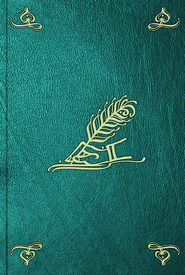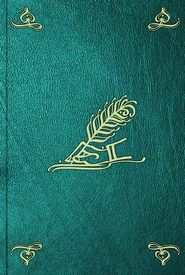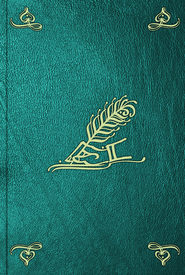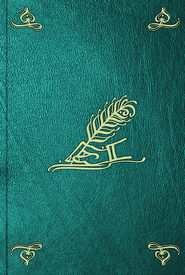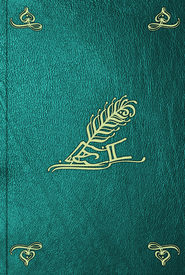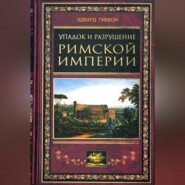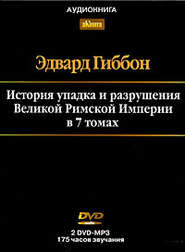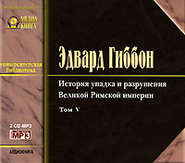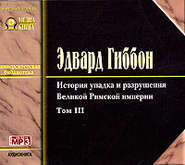По всем вопросам обращайтесь на: info@litportal.ru
(©) 2003-2025.
✖
Private Letters of Edward Gibbon (1753-1794) Volume 1 (of 2)
Настройки чтения
Размер шрифта
Высота строк
Поля
Footnote_184_184
Isaac Holroyd, who, by his wife, Dorothy Baker, was the father of John Baker Holroyd, lived at Bath, where he died in May, 1778. With him lived his only surviving daughter, Sarah Martha Holroyd, who died unmarried, some years later, at Bath. She translated, says Miss Burney, from the French version a German work, in four thick volumes – Sturm's Religious Meditations and Observations for every Day in the Year. Both Mr. and Miss Holroyd are frequently mentioned in the letters.
Footnote_185_185
The charges against Lord Clive, the famine in Bengal (1770), and the financial embarrassments of the East India Company, had for many months attracted public attention. In April, 1772, a Select Committee of the House of Commons was appointed to investigate the Company's affairs. During the recess (June 10 to November 26) the directors applied to Lord North for a loan of £1,500,000. On November 26 Parliament met, being specially summoned to discuss the state of India, and Lord North proposed and carried a motion for a Secret Committee of Inquiry. Four months later (March 9, 1773), Lord North proposed to lend to the Company £1,400,000, on condition that its dividends were restricted, and its surplus revenues appropriated to the liquidation of the debt. On these conditions, the Company was to enjoy possession of the territorial acquisitions till 1779, when its exclusive charter expired.
On May 3, the General Court of Proprietors of East India Stock petitioned Parliament against arbitrary interference with their territorial rights. The petition was ordered to lie on the table, and Lord North introduced the outlines of his scheme for the reconstitution of the Company. The chief changes were the appointment by the Crown of a governor-general and the establishment at Calcutta of a Supreme Court of Judicature. These changes and the provisions for the loans were embodied in two Bills, which received the royal assent on June 21 and July 1 respectively (13 Geo. III. cc. 63 & 64).
On May 10, whilst Lord North's proposals were under discussion, General Burgoyne moved three resolutions: (1) That all acquisitions made by military force or by treaty with foreign powers do of right belong to the State; (2) that to appropriate such acquisitions to private use is illegal; (3) that such acquisitions have been appropriated by private persons.
The first two resolutions, which virtually transferred to the Crown the territorial acquisitions made by the Company in India, were carried that night without a division. The third, which was practically an indictment of Lord Clive, was rejected on May 21.
John Burgoyne (1722-1792) married Lady Charlotte Stanley in 1743, and through Lord Derby's influence was now M.P. for Preston. He was made a major-general in 1772. His motion on the East India Company was his chief political achievement, his surrender at Saratoga (October 17, 1777) the most striking episode in his military career, and his comedy, The Heiress (1786), his chief literary success.
Footnote_186_186
Alexander Wedderburn (1733-1805), Solicitor-General (January 22, 1771), succeeded Edward Thurlow (Lord Chancellor, 1778) as Attorney-General, became Lord Chief Justice of the common Pleas and Lord Loughborough in June, 1780, was Lord Chancellor from 1793 to 1801, created Earl of Rosslyn in 1801, and died in 1805.
Footnote_187_187
The king left Kew on Tuesday, June 22, 1773, and reached Portsmouth between ten and eleven the same morning, in order to review the fleet at Spithead, consisting of twenty ships of the line, two frigates, and three sloops. He returned to Kew on Saturday, June 26. "A very great number of yachts, and other sailing vessels and boats, many of them full of nobility and gentry," followed the royal yacht Augusta, and "an incredible multitude of people" lined the shores.
Footnote_188_188
On June 11, 1773, the Court of Proprietors of East India Stock determined to reject the loan and conditions offered by the Government; but on June 19 the East India Loan Bill was read a third time in the Lower House. Parliament was prorogued from July 1, 1773, to January 13, 1774. Sujah Dowlah was the Nawab of Oude (see note to Letter 192).
Footnote_189_189
Thomas Amory, into whom, says Hazlitt, "the soul of Rabelais passed," published (1756-66) The Life of John Buncle, Esq.– a curious book, which is in part autobiographical.
Footnote_190_190
Miss Anne Eliot, sister to Mr. Eliot, of Port Eliot, married Captain Hugh Bonfoy, R.N. Two portraits of her by Sir Joshua Reynolds are in existence – one painted in 1746, the other in 1754.
Footnote_191_191
David Hume, who was now living at Edinburgh, was, from 1763 to 1766, Secretary to the Embassy at Paris under the Earl of Hertford. The description is quoted from Mason's satire (published in 1773), An Heroic Epistle to Sir William Chambers on his Book of Gardening—
"David, who there supinely deigns to lie,
The fattest hog in Epicurus' sty,
Though drunk with Gallic wine and Gallic praise,
David shall bless Old England's halcyon days."
Footnote_192_192
William Robertson, the historian (1721-1793), whose History of Scotland (1758) and History of Charles the Fifth (1769) had already appeared, was now engaged on his History of America (1777).
Footnote_193_193
After the death of Goldsmith in 1774, Gibbon seems to have succeeded to his place as Sir Joshua's companion to places of amusement, masquerades, and ridottos (Life and Times of Sir Joshua Reynolds, vol. ii. p. 273).
Footnote_194_194
The family of Richard Owen Cambridge.
Footnote_195_195
Samuel Foote's Bankrupt was produced at the Haymarket in July, 1773, Foote himself taking the part of Sir Robert Riscounter. The play was published in 1776, with a dedication to the Marquis of Granby. It contains a vigorous attack on the licence of the press and of the "impudent, rascally Printer." "The tyranny exercised by that fellow," says Sir Robert, "is more despotic and galling than the most absolute monarch's in Asia… I wonder every man is not afraid to peep into a paper, as it is more than probable that he may meet with a paragraph that will make him unhappy for the rest of his life."
Footnote_196_196
Gibbon quotes incorrectly from Juvenal (Sat. 2, 1. 24) —
"Quis tulerit Gracchos de seditione querentes?"
Footnote_197_197
Gibbon's housekeeper.
Footnote_198_198
Alluding to negotiations between Mr. Eliot and himself for a seat in Parliament.
Footnote_199_199
Lord Chesterfield's letters to his son, Philip Stanhope, were sold by that son's widow, Mrs. Eugenia Stanhope, and published in 1774, "from the originals in her possession." M. Deyverdun was at this time tutor to the young Lord Chesterfield [1755-1815], a distant kinsman of the deceased Earl. According to Walpole, an injunction was applied for to prevent the publication of the letters. Terms were, however, arranged by which the publication was permitted, on condition that the family expunged certain passages, and regained possession of such copies as had been made of the unpublished Portraits, or Characters (Walpole to Mason, April 7, 1774).
Footnote_200_200
Probably Sir William Guise.
Footnote_201_201
Shute Barrington, afterwards Bishop of Durham.
Footnote_202_202
A tax had been proposed in the Irish Parliament of two shillings in the pound on the estates of absentee landlords. The motion was lost by 122 to 102.
Footnote_203_203
Mrs. Holroyd, through her sister-in-law, Miss Holroyd, who lived at Bath, had apparently hinted to Mrs. Gibbon at a possible attachment between Edward Gibbon and Miss Fuller, niece to Mr. Rose Fuller, of Rosehill, Sussex, M.P. for Rye.
Footnote_204_204
The Cambridges, the "eloquent Nymphs of Twickenham."
Footnote_205_205
Isaac Holroyd, who, by his wife, Dorothy Baker, was the father of John Baker Holroyd, lived at Bath, where he died in May, 1778. With him lived his only surviving daughter, Sarah Martha Holroyd, who died unmarried, some years later, at Bath. She translated, says Miss Burney, from the French version a German work, in four thick volumes – Sturm's Religious Meditations and Observations for every Day in the Year. Both Mr. and Miss Holroyd are frequently mentioned in the letters.
Footnote_185_185
The charges against Lord Clive, the famine in Bengal (1770), and the financial embarrassments of the East India Company, had for many months attracted public attention. In April, 1772, a Select Committee of the House of Commons was appointed to investigate the Company's affairs. During the recess (June 10 to November 26) the directors applied to Lord North for a loan of £1,500,000. On November 26 Parliament met, being specially summoned to discuss the state of India, and Lord North proposed and carried a motion for a Secret Committee of Inquiry. Four months later (March 9, 1773), Lord North proposed to lend to the Company £1,400,000, on condition that its dividends were restricted, and its surplus revenues appropriated to the liquidation of the debt. On these conditions, the Company was to enjoy possession of the territorial acquisitions till 1779, when its exclusive charter expired.
On May 3, the General Court of Proprietors of East India Stock petitioned Parliament against arbitrary interference with their territorial rights. The petition was ordered to lie on the table, and Lord North introduced the outlines of his scheme for the reconstitution of the Company. The chief changes were the appointment by the Crown of a governor-general and the establishment at Calcutta of a Supreme Court of Judicature. These changes and the provisions for the loans were embodied in two Bills, which received the royal assent on June 21 and July 1 respectively (13 Geo. III. cc. 63 & 64).
On May 10, whilst Lord North's proposals were under discussion, General Burgoyne moved three resolutions: (1) That all acquisitions made by military force or by treaty with foreign powers do of right belong to the State; (2) that to appropriate such acquisitions to private use is illegal; (3) that such acquisitions have been appropriated by private persons.
The first two resolutions, which virtually transferred to the Crown the territorial acquisitions made by the Company in India, were carried that night without a division. The third, which was practically an indictment of Lord Clive, was rejected on May 21.
John Burgoyne (1722-1792) married Lady Charlotte Stanley in 1743, and through Lord Derby's influence was now M.P. for Preston. He was made a major-general in 1772. His motion on the East India Company was his chief political achievement, his surrender at Saratoga (October 17, 1777) the most striking episode in his military career, and his comedy, The Heiress (1786), his chief literary success.
Footnote_186_186
Alexander Wedderburn (1733-1805), Solicitor-General (January 22, 1771), succeeded Edward Thurlow (Lord Chancellor, 1778) as Attorney-General, became Lord Chief Justice of the common Pleas and Lord Loughborough in June, 1780, was Lord Chancellor from 1793 to 1801, created Earl of Rosslyn in 1801, and died in 1805.
Footnote_187_187
The king left Kew on Tuesday, June 22, 1773, and reached Portsmouth between ten and eleven the same morning, in order to review the fleet at Spithead, consisting of twenty ships of the line, two frigates, and three sloops. He returned to Kew on Saturday, June 26. "A very great number of yachts, and other sailing vessels and boats, many of them full of nobility and gentry," followed the royal yacht Augusta, and "an incredible multitude of people" lined the shores.
Footnote_188_188
On June 11, 1773, the Court of Proprietors of East India Stock determined to reject the loan and conditions offered by the Government; but on June 19 the East India Loan Bill was read a third time in the Lower House. Parliament was prorogued from July 1, 1773, to January 13, 1774. Sujah Dowlah was the Nawab of Oude (see note to Letter 192).
Footnote_189_189
Thomas Amory, into whom, says Hazlitt, "the soul of Rabelais passed," published (1756-66) The Life of John Buncle, Esq.– a curious book, which is in part autobiographical.
Footnote_190_190
Miss Anne Eliot, sister to Mr. Eliot, of Port Eliot, married Captain Hugh Bonfoy, R.N. Two portraits of her by Sir Joshua Reynolds are in existence – one painted in 1746, the other in 1754.
Footnote_191_191
David Hume, who was now living at Edinburgh, was, from 1763 to 1766, Secretary to the Embassy at Paris under the Earl of Hertford. The description is quoted from Mason's satire (published in 1773), An Heroic Epistle to Sir William Chambers on his Book of Gardening—
"David, who there supinely deigns to lie,
The fattest hog in Epicurus' sty,
Though drunk with Gallic wine and Gallic praise,
David shall bless Old England's halcyon days."
Footnote_192_192
William Robertson, the historian (1721-1793), whose History of Scotland (1758) and History of Charles the Fifth (1769) had already appeared, was now engaged on his History of America (1777).
Footnote_193_193
After the death of Goldsmith in 1774, Gibbon seems to have succeeded to his place as Sir Joshua's companion to places of amusement, masquerades, and ridottos (Life and Times of Sir Joshua Reynolds, vol. ii. p. 273).
Footnote_194_194
The family of Richard Owen Cambridge.
Footnote_195_195
Samuel Foote's Bankrupt was produced at the Haymarket in July, 1773, Foote himself taking the part of Sir Robert Riscounter. The play was published in 1776, with a dedication to the Marquis of Granby. It contains a vigorous attack on the licence of the press and of the "impudent, rascally Printer." "The tyranny exercised by that fellow," says Sir Robert, "is more despotic and galling than the most absolute monarch's in Asia… I wonder every man is not afraid to peep into a paper, as it is more than probable that he may meet with a paragraph that will make him unhappy for the rest of his life."
Footnote_196_196
Gibbon quotes incorrectly from Juvenal (Sat. 2, 1. 24) —
"Quis tulerit Gracchos de seditione querentes?"
Footnote_197_197
Gibbon's housekeeper.
Footnote_198_198
Alluding to negotiations between Mr. Eliot and himself for a seat in Parliament.
Footnote_199_199
Lord Chesterfield's letters to his son, Philip Stanhope, were sold by that son's widow, Mrs. Eugenia Stanhope, and published in 1774, "from the originals in her possession." M. Deyverdun was at this time tutor to the young Lord Chesterfield [1755-1815], a distant kinsman of the deceased Earl. According to Walpole, an injunction was applied for to prevent the publication of the letters. Terms were, however, arranged by which the publication was permitted, on condition that the family expunged certain passages, and regained possession of such copies as had been made of the unpublished Portraits, or Characters (Walpole to Mason, April 7, 1774).
Footnote_200_200
Probably Sir William Guise.
Footnote_201_201
Shute Barrington, afterwards Bishop of Durham.
Footnote_202_202
A tax had been proposed in the Irish Parliament of two shillings in the pound on the estates of absentee landlords. The motion was lost by 122 to 102.
Footnote_203_203
Mrs. Holroyd, through her sister-in-law, Miss Holroyd, who lived at Bath, had apparently hinted to Mrs. Gibbon at a possible attachment between Edward Gibbon and Miss Fuller, niece to Mr. Rose Fuller, of Rosehill, Sussex, M.P. for Rye.
Footnote_204_204
The Cambridges, the "eloquent Nymphs of Twickenham."
Footnote_205_205







